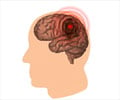Social support may help increase survival rates among people who suffer strokes, suggests a new study.
Social support may help increase survival rates among people who suffer strokes, suggests a new study.
The research conducted in mice suggests that high levels of social support may provide some protection against strokes by reducing the amount of damaging inflammation in the brain.The team from Ohio State University found that male mice that lived with a female partner before and after a stroke had a much higher survival rate compared to those mice that lived alone. Moreover, the paired mice suffered much less brain damage than did the mice living alone.
''Under nearly every measure, it seems that there was something about living together that protected the mice by reducing the damaging inflammatory response,'' said Kate Karelina, lead author of the study and a doctoral student in neuroscience at Ohio State University.
During the study, the researchers induced experimental strokes in male mice.
Some of the mice lived with a female partner for two weeks before the stroke and continuing afterwards. Other mice lived alone before and after the stroke.
And a control group of mice underwent similar surgery in the brain, but did not have an induced stroke.
Advertisement
''We confirmed that that social isolation contributes to the extent of neuronal damage in the brain as early as 24 hours after the stroke,'' said Courtney DeVries, associate professor of psychology and neuroscience at Ohio State, and a member of the university's Institute of Behavioral Medicine Research.
Advertisement
''The number of neurons dying is significantly decreased in the pair-housed mice,'' DeVries said.
Socially housed mice had significantly less edema, or excess water in the brain, when compared to the isolated animals.
''In clinical stroke, edema is a major concern because it can lead to additional neuronal damage, so it is significant that pair housing reduced edema,'' said Karelina.
Two genes associated with damaging inflammation in the brain - MAC-1 and glial fibrillary acidic protein, or GFAP - showed decreased activation in the socially housed mice.
The study also showed that mice that lived with others had significantly higher levels of a cytokine in their brain called interleukin-6 (IL-6) that has an anti-inflammatory response in the brain, helping to limit damage caused by the stroke.
The research was presented at the annual meeting of the Society for Neuroscience.
Source-ANI
SRM














